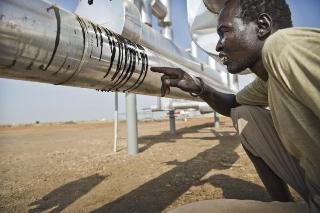South Sudan threatens to “sue” Khartoum over unilateral oil charges
January 5, 2012 (JUBA) – The government of South Sudan (GoSS) on Thursday threatened to sue Khartoum over its decision announced this week to unilaterally impose monthly charges on its crude oil transported through its pipelines.

Speaking at a press briefing on Thursday in Juba, the minister of petroleum and mining, Stephen Dhieu Dau, said it was an unfortunate and surprising development to learn that Bashir had authorised the “illegal” imposition of unilateral charges.
Dau said the government had not received official notification from the Sudanese government regarding this decision.
“It is unfortunate that the Sudanese government, with the knowledge of President Bashir, has resorted to stealing crude oil because they have always failed to convince us on the negotiation table”, Dau told reporters.
“This is a clear criminal act”, the minister said explaining that the country’s council of ministers would decide what to do.
The minister said there was no alternative but to “sue them”. He did not elaborate on which court a complaint would be filed against Khartoum.
Sudan state media quoted Bashir on Wednesday as saying South Sudan was benefiting from an absence of mandatory transport fees and that its stance in talks showed it was not serious about reaching an agreement with Khartoum.
“Because of this we had taken a unilateral decision to impose passage fees on the crude oil every month, and this is our right,” Bashir said.
Bashir announced Sudan’s decision a day after South Sudan president, Salva Kiir, accused Khartoum of stealing oil, but did not disclose how much had been taken by Khartoum.
A source close to the South Sudanese government told Sudan Tribune said that Khartoum stole 1.2 million barrels of oil from the pipelines and diverted it to refineries of al-Obeid in North Kordofan and al-Gailey in north Khartoum.
South Sudan may soon take the decision to stop pumping oil, the source added.
Earlier, Dau stated that Sudan had detained one month’s output of crude oil from leaving Port Sudan without providing an reason, adding that another one million barrels of crude oil was blocked on 25 December.
He said Juba was aware that they will have to pay Khartoum for use of its oil pipeline and port to ship the oil, but the two sides have to amicably reach an agreement. The negotiations are due to resume in mid-January after talks in November failed amid accusations that Khartoum temporarily blocked the loading of crude oil.
With South Sudan’s secession in July 2011, Khartoum lost direct access to three quarters of its oilfields that existed under a united country.
South Sudan’s economy is dominated by oil. As South Sudan is landlocked, export of the oil is monopolised by Khartoum’s pipeline to the eastern coastal city of Port Sudan.
Juba is in negotiations to build a costly alternative pipeline to the Kenyan coast, which would ease Khartoum’s grip on its purse strings.
Dau said the two sides had agreed in Ethiopia in November for Juba to continue using the oil infrastructure until when the two parties reached a final accord after which it will pay all arrears.
(ST)
